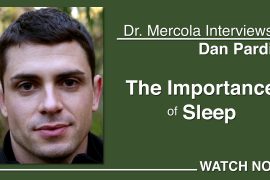The Risks of ‘Just Getting By’ on Minimal Sleep
If you’re tired during the day, there’s a good chance you need to get more sleep. Even if you think can “get by” on five or six hours a night, you’re not fooling your body. Sleep deprivation has the same effect on your immune system as physical stress or illness,7 which may help explain why lack of sleep is tied to an increased risk of numerous chronic diseases. Sleeping less than six hours per night more than triples your risk of high blood pressure, and women who get less than four hours of shut-eye per night double their chances of dying from heart disease.
According to research from Great Britain, poor or insufficient sleep is actually the strongest predictor for pain in adults over 50 and people with chronic sleep problems may develop Alzheimer’s disease sooner than those who sleep well.
Poor sleep can actually impact virtually every aspect of your health, and the reason for this is because your circadian rhythm (sleep-wake cycle) actually “drives” the rhythms of biological activity at the cellular level. Hence disruptions tend to cascade outward throughout your entire body. For example, besides making you more susceptible to physical aches and pains, interrupted or impaired sleep can also:
- Increase your risk of cancer
- Harm your brain by halting new neuron production. Sleep deprivation can increase levels of corticosterone (a stress hormone), resulting in fewer new brain cells being created in your hippocampus
- Contribute to a pre-diabetic state, making you feel hungry even if you’ve already eaten, which can lead to weight gain
- Contribute to premature aging by interfering with your growth hormone production, normally released by your pituitary gland during deep sleep (and during certain types of exercise, such as high-intensity interval training)
- Increase your risk of dying from any cause
You Probably Need to Go to Bed Earlier Than You Think
You may be surprised at how little sleep you’re actually getting. If you go to bed at 10 pm and get out of bed at 7 am, you might say you’ve slept for nine hours. In reality, you probably spent at least 15-30 minutes falling asleep and may have woken during the night one or more times. With the advent of fitness-tracking wristbands such as Jawbone’s UP, however, it’s now possible to track your actual sleep time. When I first started using a fitness tracker, I was striving to get 8 hours of sleep, but my Jawbone UP typically recorded me at 7.5 to 7.75.
I have been using an UP tracker for the last six months and just the last month have finally been able to restructure my schedule so that I am getting close to 9 hours of sleep. Quite a contrast from when I was seeing patients, as it would typically be far closer to an unhealthy 5 hours or less. I have since increased my sleep time, not just time in bed, but total sleep time to over 8 hours per day. The fitness tracker helped me realize that unless I am asleep, not just in bed, but asleep by 10 pm I won’t get my 8 hours. Gradually I have been able to get this down to 9:30 pm.
The tracker also differentiates between sound and light sleep, and through trial and error, I was able to use the device to figure out I can get 6 hours of deep sleep if I maintain my air temperature around 66-68 degrees F with only a light sheet on. If it is much warmer or I use a blanket, my sound sleep can drop to 2-3. Pardi recently shared how having a baby has helped to improve his overall sleep because it got him in the habit of going to sleep earlier, and importantly, getting into bed prior to feeling sleepy.



